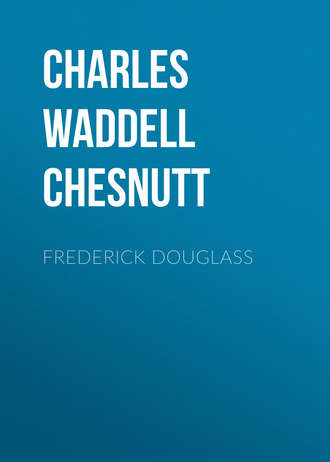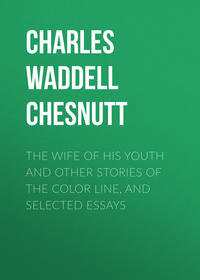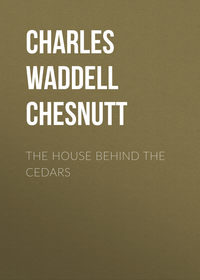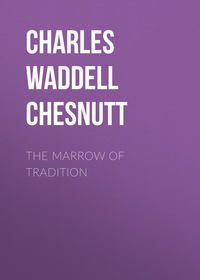 полная версия
полная версияFrederick Douglass
The loss of slaves had become a serious drain upon the border States. The number of refugees settled in the North was, of course, largely a matter of estimate. Runaway slaves were not apt to advertise their status, but rather to conceal it, so that most estimates were more likely to be under than over the truth. Henry Wilson places the number in the free States at twenty thousand. There were in Boston in 1850, according to a public statement of Theodore Parker, from four to six hundred; and in other New England towns, notably New Bedford, the number was large. Other estimates place the figures much higher. Mr. Siebert, in his Underground Railroad, after a careful calculation from the best obtainable data, puts the number of fugitives aided in Ohio alone at forty thousand in the thirty years preceding 1860, and in the same period nine thousand in the city of Philadelphia alone, which was one of the principal stations of the underground railroad and the home of William Still, whose elaborate work on the Underground Railroad gives the details of many thrilling escapes.
In the work of assisting runaway slaves Douglass found congenial employment. It was exciting and dangerous, but inspiring and soul-satisfying. He kept a room in his house always ready for fugitives, having with him as many as eleven at a time. He would keep them over night, pay their fare on the train for Canada, and give them half a dollar extra. And Canada, to her eternal honor be it said, received these assisted emigrants, with their fifty cents apiece, of alien race, debauched by slavery, gave them welcome and protection, refused to enter into diplomatic relations for their rendition to bondage, and spoke well of them as men and citizens when Henry Clay and the other slave [pro-slavery] leaders denounced them as the most worthless of their class. The example of Canada may be commended to those persons in the United States, of little faith, who, because in thirty years the emancipated race have not equalled the white man in achievement, are fearful lest nothing good can be expected of them.
In the stirring years of the early fifties Douglass led a busy life. He had each week to fill the columns of his paper and raise the money to pay its expenses. Add to this his platform work and the underground railroad work, which consisted not only in personal aid to the fugitives, but in raising money to pay their expenses, and his time was very adequately employed. In every anti-slavery meeting his face was welcome, and his position as a representative of his own peculiar people was daily strengthened.
When Uncle Tom's Cabin, in 1852, set the world on fire over the wrongs of the slave,—or rather the wrongs of slavery, for that wonderful book did not portray the negro as the only sufferer from this hoary iniquity,—Mrs. Stowe, in her new capacity as a champion of liberty, conceived the plan of raising a fund for the benefit of the colored race, and in 1853 invited Douglass to visit her at Andover, Massachusetts, where she consulted with him in reference to the establishment of an industrial institute or trades school for colored youth, with a view to improving their condition in the free States. Douglass approved heartily of this plan, and through his paper made himself its sponsor. When, later on, Mrs. Stowe abandoned the project, Douglass was made the subject of some criticism, though he was not at all to blame for Mrs. Stowes altered plans. In our own time the value of such institutions has been widely recognized, and the success of those at Hampton and Tuskegee has stimulated anew the interest in industrial education as one important factor in the elevation of the colored race.
In the years from 1853 to 1860 the slave power, inspired with divine madness, rushed headlong toward its doom. The arbitrary enforcement of the Fugitive Slave Act; the struggle between freedom and slavery in Kansas; the Dred Scott decision, by which a learned and subtle judge, who had it within his power to enlarge the boundaries of human liberty and cover his own name with glory, deliberately and laboriously summarized and dignified with the sanction of a court of last resort all the most odious prejudices that had restricted the opportunities of the colored people; the repeal of the Missouri Compromise; the John Brown raid; the [1855] assault on [Massachusetts antislavery U.S. Senator] Charles Sumner,—each of these incidents has been, in itself, the subject of more than one volume. Of these events the Dred Scott decision was the most disheartening. Douglass was not proof against the universal gloom, and began to feel that there was little hope of the peaceful solution of the question of slavery. It was in one of his darker moments that old Sojourner Truth, whose face appeared in so many anti-slavery gatherings, put her famous question, which breathed a sublime and childlike faith in God, even when his hand seemed heaviest on her people: "Frederick," she asked, "is God dead?" The orator paused impressively, and then thundered in a voice that thrilled his audience with prophetic intimations, "No, God is not dead; and therefore it is that slavery must end in blood!"
During this period John Brown stamped his name indelibly upon American history. It was almost inevitable that a man of the views, activities, and prominence of Douglass should become acquainted with John Brown. Their first meeting, however, was in 1847, more than ten years before the tragic episode at Harpers Ferry. At that time Brown was a merchant at Springfield, Massachusetts, whither Douglass was invited to visit him. In his Life and Times he describes Brown as a prosperous merchant, who in his home lived with the utmost abstemiousness, in order that he might save money for the great scheme he was already revolving. "His wife believed in him, and his children observed him with reverence. His arguments seemed to convince all, his appeals touched all, and his will impressed all. Certainly, I never felt myself in the presence of stronger religious influence than while in this man's house." There in his own home, where Douglass stayed as his guest, Brown outlined a plan which in substantially the same form he held dear to his heart for a decade longer. This plan, briefly stated, was to establish camps at certain easily defended points in the Allegheny Mountains; to send emissaries down to the plantations in the lowlands, starting in Virginia, and draw off the slaves to these mountain fastnesses; to maintain bands of them there, if possible, as a constant menace to slavery and an example of freedom; or, if that were impracticable, to lead them to Canada from time to time by the most available routes. Wild as this plan may seem in the light of the desperate game subsequently played by slavery, it did not at the time seem impracticable to such level-headed men as Theodore Parker and Thomas Wentworth Higginson.
Douglass's views were very much colored by his association with Brown; but, with his usual prudence and foresight, he pointed out the difficulties of this plan. From the time of their first meeting the relations of the two men were friendly and confidential. Captain Brown had his scheme ever in mind, and succeeded in convincing Douglass and others that it would subserve a useful purpose,—that, even if it resulted in failure, it would stir the conscience of the nation to a juster appreciation of the iniquity of slavery.
The Kansas troubles, however, turned Brown's energies for a time into a different channel. After Kansas had been secured to freedom, he returned with renewed ardor to his old project. He stayed for three weeks at Douglass's house at Rochester, and while there carried on an extensive correspondence with sympathizers and supporters, and thoroughly demonstrated to all with whom he conversed that he was a man of one all-absorbing idea.
In 1859, very shortly before the raid at Harpers Ferry, Douglass met Brown by appointment, in an abandoned stone quarry near Chambersburg, Pennsylvania. John Brown was already an outlaw, with a price upon his head; for a traitor had betrayed his plan the year before, and he had for this reason deferred its execution for a year. The meeting was surrounded by all the mystery and conducted with all the precautions befitting a meeting of conspirators. Brown had changed the details of his former plan, and told Douglass of his determination to take Harpers Ferry. Douglass opposed the measure vehemently, pointing out its certain and disastrous failure. Brown met each argument with another, and was not to be swayed from his purpose. They spent more than a day together discussing the details of the movement. When the more practical Douglass declined to take part in Brown's attempt, the old man threw his arms around his swarthy friend, in a manner typical of his friendship for the dark race, and said: "Come with me, Douglass, I will defend you with my life. I want you for a special purpose. When I strike, the bees will begin to swarm, and I shall want you to help hive them." But Douglass would not be persuaded. His abandonment of his old friend on the eve of a desperate enterprise was criticised by some, who, as Douglass says, "kept even farther from this brave and heroic man than I did." John Brown went forth to meet a felon's fate and wear a martyr's crown: Douglass lived to fight the battles of his race for years to come. There was room for both, and each played the part for which he was best adapted. It would have strengthened the cause of liberty very little for Douglass to die with Brown.
It is quite likely, however, that he narrowly escaped Brown's fate. When the raid at Harpers Ferry had roused the country, Douglass, with other leading Northern men, was indicted in Virginia for complicity in the affair. Brown's correspondence had fallen into the hands of the Virginia authorities, and certain letters seemed to implicate Douglass. A trial in Virginia meant almost certain death. Governor Wise, of Virginia, would have hung him with cheerful alacrity, and publicly expressed his desire to do so. Douglass, with timely warning that extradition papers had been issued for his arrest, escaped to Canada. He had previously planned a second visit to England, and the John Brown affair had delayed his departure by some days. He sailed from Quebec, November 12, 1859.
After a most uncomfortable winter voyage of fourteen days Douglass found himself again in England, an object of marked interest and in very great demand as a speaker. Six months he spent on the hospitable shores of Great Britain, lecturing on John Brown, on slavery and other subjects, and renewing the friendships of former years. Being informed of the death of his youngest daughter, he cut short his visit, which he had meant to extend to France, and returned to the United States. So rapid had been the course of events since his departure that the excitement over the John Brown raid had subsided. The first Lincoln campaign was in active progress; and the whole country quivered with vague anticipation of the impending crisis which was to end the conflict of irreconcilable principles, and sweep slavery out of the path of civilization and progress. Douglass plunged into the campaign with his accustomed zeal, and did what he could to promote the triumph of the Republican party. Lincoln was elected, and in a few short months the country found itself in the midst of war. God was not dead, and slavery was to end in blood.
IX
Ever mindful of his people and seeking always to promote their welfare, Douglass was one of those who urged, in all his addresses at this period, the abolition of slavery and the arming of the negroes as the most effective means of crushing the rebellion. In 1862 he delivered a series of lectures in New England under the auspices of the recently formed Emancipation League, which contended for abolition as a military necessity.
The first or conditional emancipation proclamation was issued in September, 1862; and shortly afterward Douglass published a pamphlet for circulation in Great Britain, entitled The Slave's Appeal to Great Britain, in which he urged the English people to refuse recognition of the independence of the Confederate States. He always endeavored in his public utterances to remove the doubts and fears of those who were tempted to leave the negroes in slavery because of the difficulty of disposing of them after they became free. Douglass, with the simple, direct, primitive sense of justice that had always marked his mind, took the only true ground for the solution of the race problems of that or any other epoch,-that the situation should be met with equal and exact justice, and that his people should be allowed to do as they pleased with themselves, "subject only to the same great laws which apply to other men." He was a conspicuous figure at the meeting in Tremont Temple, Boston, on January 1, 1863, when the Emancipation Proclamation, hourly expected by an anxious gathering, finally flashed over the wires. Douglass was among the first to suggest the employment of colored troops in the Union army. In spite of all assertions to the contrary, he foresaw in the war the end of slavery. He perceived that by the enlistment of colored men not only would the Northern arms be strengthened, but his people would win an opportunity to exercise one of the highest rights of freemen, and by valor on the field of battle to remove some of the stigma that slavery had placed upon them. He strove through every channel at his command to impress his views upon the country; and his efforts helped to swell the current of opinion which found expression, after several intermediate steps, in the enlistment of two colored regiments by Governor Andrew, the famous war governor of Massachusetts, a State foremost in all good works. When Mr. Lincoln had granted permission for the recruiting of these regiments, Douglass issued through his paper a stirring appeal, which was copied in the principal journals of the Union States, exhorting his people to rally to this call, to seize this opportunity to strike a blow at slavery and win the gratitude of the country and the blessings of liberty for themselves and their posterity.
Douglass exerted himself personally in procuring enlistments, his two sons [his youngest and his oldest], Charles and Lewis, being [among] the first in New York to enlist; for the two Massachusetts regiments were recruited all over the North. Lewis H. Douglass, sergeant-major in the Fifty-fourth Massachusetts, was among the foremost on the ramparts at Fort Wagner. Both these sons of Douglass survived the war, and are now well known and respected citizens of Washington, D.C. The Fifty-fourth Massachusetts, under the gallant but ill-fated Colonel Shaw, won undying glory in the conflict; and the heroic deeds of the officers and men of this regiment are fittingly commemorated in the noble monument by St. Gaudens, recently erected on Boston Common, to stand as an inspiration of freedom and patriotism for the future and as testimony that a race which for generations had been deprived of arms and liberty could worthily bear the one and defend the other.
Douglass was instrumental in persuading the government to put colored soldiers on an equal footing with white soldiers, both as to pay and protection. In the course of these efforts he was invited to visit President Lincoln. He describes this memorable interview in detail in his Life and Times. The President welcomed him with outstretched hands, put him at once at his ease, and listened patiently and attentively to all that he had to say. Douglass maintained that colored soldiers should receive the same pay as white soldiers, should be protected and exchanged as prisoners, and should be rewarded, by promotion, for deeds of valor. The President suggested some of the difficulties to be overcome; but both he and Secretary of War Stanton, whom Douglass also visited, assured him that in the end his race should be justly treated. Stanton, before the close of the interview with him, promised Douglass a commission as assistant adjutant to General Lorenzo Thomas, then recruiting colored troops in the Mississippi Valley. But Stanton evidently changed his mind, since the commission, somewhat to Douglass's chagrin, never came to hand.
When McClellan had been relieved by Grant, and the new leader of the Union forces was fighting the stubbornly contested campaign of the Wilderness, President Lincoln again sent for Douglass, to confer with him with reference to bringing slaves in the rebel States within the Union lines, so that in the event of premature peace as many slaves as possible might be free. Douglass undertook, at the President's suggestion, to organize a band of colored scouts to go among the negroes and induce them to enter the Union lines. The plan was never carried out, owing to the rapid success of the Union arms; but the interview greatly impressed Douglass with the sincerity of the President's conviction against slavery and his desire to see the war result in its overthrow. What the colored race may have owed to the services, in such a quarter, of such an advocate as Douglass, brave, eloquent, high-principled, and an example to Lincoln of what the enslaved race was capable of, can only be imagined. That Lincoln was deeply impressed by these interviews is a matter of history.
Douglass supported vigorously the nomination of Lincoln for a second term, and was present at his [March 4] inauguration. And a few days later, while the inspired words of the inaugural address, long bracketed with the noblest of human utterances, were still ringing in his ears, he spoke at the meeting held in Rochester to mourn the death of the martyred President, and made one of his most eloquent and moving addresses. It was a time that wrung men's hearts, and none more than the strong-hearted man's whose race had found its liberty through him who lay dead at Washington, slain by the hand of an assassin whom slavery had spawned.
X
With the fall of slavery and the emancipation of the colored race the heroic epoch of Douglass's career may be said to have closed. The text upon which he so long had preached had been expunged from the national bible; and he had been a one-text preacher, a one-theme orator. He felt the natural reaction which comes with relief from high mental or physical tension, and wondered, somewhat sadly, what he should do with himself, and how he should earn a living. The same considerations, in varying measure, applied to others of the anti-slavery reformers. Some, unable to escape the reforming habit, turned their attention to different social evils, real or imaginary. Others, sufficiently supplied with this worlds goods for their moderate wants, withdrew from public life. Douglass was thinking of buying a farm and retiring to rural solitudes, when a new career opened up for him in the lyceum lecture field. The North was favorably disposed toward colored men. They had acquitted themselves well during the war, and had shown becoming gratitude to their deliverers. The once despised abolitionists were now popular heroes. Douglass's checkered past seemed all the more romantic in the light of the brighter present, like a novel with a pleasant ending; and those who had hung thrillingly upon his words when he denounced slavery now listened with interest to what he had to say upon other topics. He spoke sometimes on Woman Suffrage, of which he was always a consistent advocate. His most popular lecture was one on "Self-made Men." Another on "Ethnology," in which he sought a scientific basis for his claim for the negro's equality with the white man, was not so popular—with white people. The wave of enthusiasm which had swept the enfranchised slaves into what seemed at that time the safe harbor of constitutional right was not, after all, based on abstract doctrines of equality of intellect, but on an inspiring sense of justice (long dormant under the influence of slavery, but thoroughly awakened under the moral stress of the war), which conceded to every man the right of a voice in his own government and the right to an equal opportunity in life to develop such powers as he possessed, however great or small these might be.
But Douglass's work in direct behalf of his race was not yet entirely done. In fact, he realized very distinctly the vast amount of work that would be necessary to lift his people up to the level of their enlarged opportunities; and, as may be gathered from some of his published utterances, he foresaw that the process would be a long one, and that their friends might weary sometimes of waiting, and that there would be reactions toward slavery which would rob emancipation of much of its value. It was the very imminence of such backward steps, in the shape of various restrictive and oppressive laws promptly enacted by the old slave States under President Johnson's administration, that led Douglass to urge the enfranchisement of the freedmen. He maintained that in a free country there could be no safe or logical middle ground between the status of freeman and that of serf. There has been much criticism because the negro, it is said, acquired the ballot prematurely. There seemed imperative reasons, besides that of political expediency, for putting the ballot in his hands. Recent events have demonstrated that this necessity is as great now as then. The assumption that negroes—under which generalization are included all men of color, regardless of that sympathy to which kinship at least should entitle many of them—are unfit to have a voice in government is met by the words of Lincoln, which have all the weight of a political axiom: "No man can be safely trusted to govern other men without their consent." The contention that a class who constitute half the population of a State shall be entirely unrepresented in its councils, because, forsooth, their will there expressed may affect the government of another class of the same general population, is as repugnant to justice and human rights as was the institution of slavery itself. Such a condition of affairs has not the melodramatic and soul-stirring incidents of chattel slavery, but its effects can be as far-reaching and as debasing. There has been some manifestation of its possible consequences in the recent outbreaks of lynching and other race oppression in the South. The practical disfranchisement of the colored people in several States, and the apparent acquiescence by the Supreme Court in the attempted annulment, by restrictive and oppressive laws, of the war amendments to the Constitution, have brought a foretaste of what might be expected should the spirit of the Dred Scott decision become again the paramount law of the land.
On February 7, 1866, Douglass acted as chief spokesman of a committee of leading colored men of the country, who called upon President Johnson to urge the importance of enfranchisement. Mr. Johnson, true to his Southern instincts, was coldly hostile to the proposition, recounted all the arguments against it, and refused the committee an opportunity to reply. The matter was not left with Mr. Johnson, however; and the committee turned its attention to the leading Republican statesmen, in whom they found more impressionable material. Under the leadership of Senators Sumner, Wilson, Wade, and others, the matter was fully argued in Congress, the Democratic party being in opposition, as always in national politics, to any measure enlarging the rights or liberties of the colored race.
In September, 1866, Douglass was elected a delegate from Rochester to the National Loyalists' Convention at Philadelphia, called to consider the momentous questions of government growing out of the war. While he had often attended anti-slavery conventions as the representative of a small class of abolitionists, his election to represent a large city in a national convention was so novel a departure from established usage as to provoke surprise and comment all over the country. On the way to Philadelphia he was waited upon by a committee of other delegates, who came to his seat on the train and urged upon him the impropriety of his taking a seat as a delegate. Douglass listened patiently, but declined to be moved by their arguments. He replied that he had been duly elected a delegate from Rochester, and he would represent that city in the convention. A procession of the members and friends of the convention was to take place on its opening day. Douglass was solemnly warned that, if he walked in the procession, he would probably be mobbed. But he had been mobbed before, more than once, and had lived through it; and he promptly presented himself at the place of assembly. His reception by his fellow-delegates was not cordial, and he seemed condemned to march alone in the procession, when Theodore Tilton, at that time editor of the Independent, paired off with him, and marched by his side through the streets of the Quaker City. The result was gratifying alike to Douglass and the friends of liberty and progress. He was cheered enthusiastically all along the line of march, and became as popular in the convention as he had hitherto been neglected.






